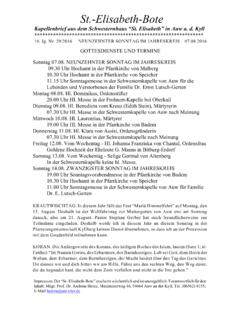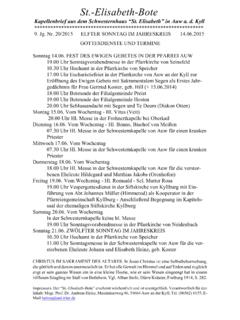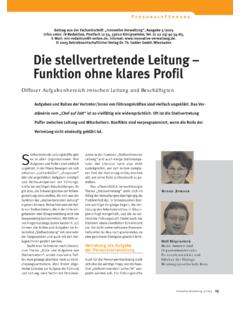Transcription of Ancient Egyptian and Modern Yoruba : Phonetic …
1 Ancient Egyptian and Modern Yoruba : Phonetic Regularity 98 _____ Statue Yoruba , Nig ria. National Museum of African Art, Smithsonian Institution, ANKH n 16 ann e 2007 Ancient Egyptian and Modern Yoruba : Phonetic Regularity 99 _____ Ancient Egyptian and Modern Yoruba : Phonetic Regularity Th ophile OBENGA _____ Abstract : This exploratory study, according to the linguistic comparative method, tries to show that large numbers of cognate lexical items are available between Egyptian pharaonic language and Modern Yoruba of Nigeria. R sum : gyptien ancien et Yoruba moderne : r gularit phon tique. Cette tude exploratrice, selon la m thode de la linguistique comparative, essaie de montrer qu il existe une quantit suffisante de faits lexicaux h rit s entre l Egyptien pharaonique et le Yoruba moderne parl au Nig ria.
2 1. Question of method in comparative linguistics Any language in the world does not change its tradition from its birth to its death. Greek language, with its many dialects, through time and space, since the Mycenean idiom, will always remain Greek, and never some other langrage like Phoenician or Latin. Likewise, Yoruba has been always Yoruba since the remote past. If Yoruba and Ancient Egyptian pharaonic language show very close sound correspondences between them, it means that the two languages are genetically related. Indeed, chance similarities between two or more languages do not obey to any system, that is, there is no regularity by mere chance or at random. Let us be more explicit. Phonetic laws and sound correspondences have exceptions, but their help is very crucial in eliminating false etymologies and dubitable reconstructions.
3 For example Greek theos, god , and Latin deus, god , seem to be very similar, therefore related, and developed from a common predialectal stock. To technically decide the following question must be answered : In what context or environment, that is, in what linguistic conditions Latin d corresponds to Greek th (th ta) ? We know that there are a few pairs in which Latin d corresponds to Greek th : Latin con-dere, Greek syn-theinai, to put together ; Latin viduos, Greek itheos, unmarried . Latin d corresponds to Greek th only in the interior of a word between vowels and after n. Therefore , Greek theos and Latin deus cannot be cognate words from one common root. Thus, the task of historical linguistics is basically grounded in the hypothesis of the regularity of Phonetic laws and sound correspondences.
4 A series of lexical facts is always _____ ANKH n 16 ann e 2007 Ancient Egyptian and Modern Yoruba : Phonetic Regularity 100 _____ required in order to eliminate chance similarities. A series of lexical data gives to the comparison its systematic appearance1. Two or more languages from the same geographical area give a lot of problems to the linguist because regularity can be due to contamination, dialect mixture, influence, borrowing of technical terms. For example, Greek and Latin influence is shown in Oscan deities, few common nouns and in some official titles : The borrowed words consist mainly of Greek words in Oscan, introduce from the neighbouring Greek colonies. 2. Ancient Egyptian pharaonic Language and Modern Yoruba language are chronologically and geographically two distant languages, however, if we find regularity in comparing them, the conviction of their common ancestrality becomes more and more probable : they belong to the same linguistic tradition and community, although their historical and spatial depth is enormous.
5 In his classification of African languages, the great scholar Joseph H. Greenberg completely missed this crucial point of comparative method, that is, correspondences and laws of sound change. Therefore, his classicatory models are not required by the rigors of the comparative method. There is no systematic sound correspondences across African languages investigated. Greenberg s method is simply the technique of the description of mass comparison without comparative method3. 2. Ethnographic linguistic data For a scholar like Bronislaw Kasper Malinowski (1884-1942) everything from non-Western world was primitive : hieroglyphic script and Egyptian grammar, primitive languages of Melanesian tribes of Eastern New Guinea, grammars and vocabularies of Oceanic languages, culture and tradition of a native community in a primitive tongue, primitive conversations of natives in the Trobriand Islands, New Guinea ; tribal psychology in ceremonial life, savage psychology, the primitive mind and the nature of primitive speech, the barbarous primitive categories, Primitive Linguistics by analyzing the mind of Primitive Man4.
6 This idea of Primitive languages , Primitive Linguistics , and Primitive Man is simply racist and Eurocentrist. There is no science with such concepts developed since David Hume (1711-1776) and Hegel (1770-1831). Consequently, all ethnographic linguistic data, grammars and dictionaries written in 18th 19th and 20th centuries on African languages must be used with extreme forethought. For example, Christian missionaries have translated the word o-k in Bantu-Mbochi (Congo) by evil or devil (demon) ; in fact, o-k , pl. i-k means a dead who was _____ ANKH n 16 ann e 2007 1 Morris Swadesh, The Origin and Diversification of Language, Chicago, Aldine, 1971. 2 Carl Darling Buck, Grammar of Oscan and Umbrian, Boston, Ginn & C , 1904, Z rich, Georg Olms Verlag, 1995, p.
7 20. 3 Greenberg, Languages of Africa, The Hague, Monton, 1963. Critique by I. Fodor. 4 B. Malinowski, The Problem of Meaning in Primitive Language, pp. 296-336 in the book by Ogden and Richards, The Meaning of Meaning. A Study of the Influence of Language upon Thought and of the Science of Symbolism, New York, Harcourt, Brace and C , 1923, 1926, 1930, 1936, 1946. Ancient Egyptian and Modern Yoruba : Phonetic Regularity 101 _____ became to be a powerful spirit in the afterlife . The Egyptian correspondent is akh, to become a spirit of R in the afterlife ; akhu, power of god, etc. the concept of power, glory, mastery is the pre-eminent meaning of the word o-k . 3. Egyptian and Yoruba are cognates on the basis of regular sound correspondences Here are some linguistic relationships between Ancient Egyptian Pharaonic (Lower Nile Valley) and Yoruba (Nigeria, West Africa) on the level of lexical frequency, and the same consonantal structure does appear focussing on initial consonant system.
8 Lexical correspondences by plain labial stop /b/ initial Ancient Egyptian Yoruba 1. : bA, ba : to hoe crops (b-) b : to germinate ; agrarian world (b-) 2. : bw, bu : place (b-) ; locality i-b , ib : place (b-) ; ibi Mbochi (Bantu) : e-b : place (b-) Pulaar5 : boowal : place (boo-wal) where wal seems to be an additional element. 3. bi : good deed (b-) bi : to give birth to , what is a real good deed (semantic evolution) (b-) Mbochi (Bantu) : bii : good character (b-) 4. : bw, bu : to detest , to abominate (b-) b : to abuse (same semantic category) (b-) _____ ANKH n 16 ann e 2007 5.
9 : bs, bes : to initiate into (b-s) b si : to bless (b-s). Initiation is blessing. 6. : bs : secret (noun) (b-s) b s : secretly (b-s) Mbochi (Bantu) : b s , very secret initiation (b-s) 7. : bsA, besa : to protect (b-s) b s : to honor, respect (b-s) : to respect implies care and protection in African civilizations. Mbochi (Bantu) ! : M-B s , He who is honoured and respected for his protection 8. : bdt : emmer (corn). Coptic : bote, boti barley (b-t) b ti : malt of Guinea corn (b-t) 5 Cf. A. M. Lam, De l origine gyptienne des Peuls, Paris, Khepera/Pr sence Africaine, 1993, p.
10 394. Ancient Egyptian and Modern Yoruba : Phonetic Regularity 102 _____ The consonant /b/ is regular in initial position and introduces the same elements : b-/b-, b-s/b-s, b-d/t : b-t. In hieroglyphic script the foot is a,uniliteral phonogram with sound-value /b/. Lexical correspondences by labial nasal /m/ initial Ancient Egyptian Yoruba 1. : m : but , conjunctive m : but 2. : mw : water : mi : waters (Urkunden, IV, 616, 9) omi : water Mbochi (Bantu) : m : water 3. : mAA, maa : to see, look mo : aware Mbochi (Bantu) : m : awake _____ ANKH n 16 ann e 2007 4.



